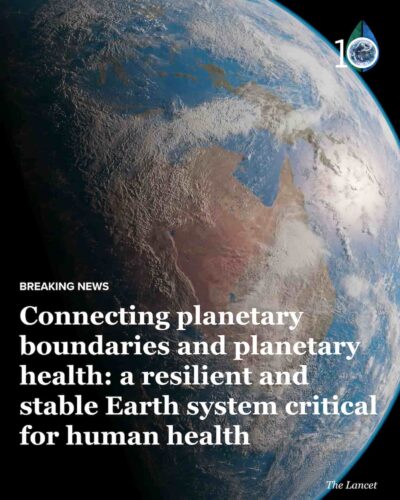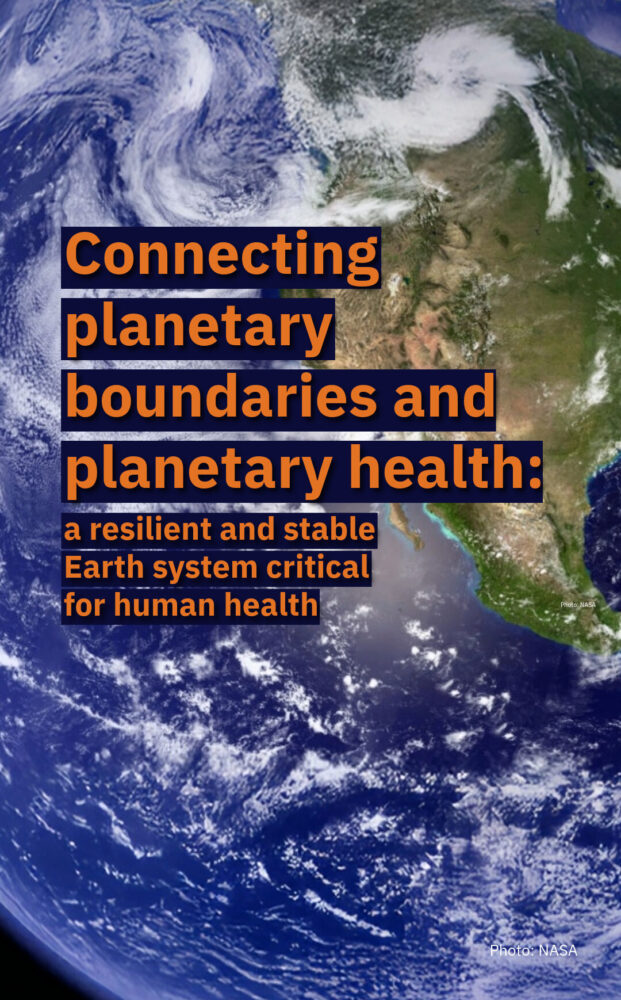
Collaboration and Partnerships Communications
• Images
News
The following press release is designed to help interested individuals and organizations share the news about leading researchers from the Planetary Health and Planetary Boundaries communities coming together to align their work.
Read The Lancet Comment and download the Press Release to share the news
WASHINGTON, DC (July 2025) — A new expert opinion piece in the medical journal The Lancet signifies unprecedented alignment between holistic scientific frameworks that examine how Earth system changes, ranging from global-scale biodiversity loss and pollution to climate disruption, are eroding the foundations of human health and well-being.
The timing is significant. This month marks 10 years since a Rockefeller Foundation–Lancet Commission report established the field and social movement of Planetary Health in 2015. Today’s commentary signals an evolution in global knowledge and collaboration as leading researchers from the Planetary Health and Planetary Boundaries communities align their work.
Human activity affects the planet in ways that extend far beyond climate change. Earth system scientists first developed the Planetary Boundaries framework in 2009 for measuring and tracking the resilience and stability of the Earth system as humanity moves deeper into the Anthropocene. It identifies boundaries for nine critical global processes—climate change being one of them—that must be respected to stay in the “safe operating space” that conveys a high likelihood of keeping Earth’s functions in a state similar to the conditions within which human societies have flourished over the past 10,000 years. A 2023 assessment indicates six of nine Planetary Boundaries are currently transgressed, which means increasing risk of destabilizing Earth’s life-support systems.
Ample evidence now shows that Earth system change poses urgent threats to human health—from impacts on air quality and water supply to food production, infectious disease exposure, and community habitability. Changes to the Earth system already affect all dimensions of health and are expected to account for a large share of the global burden of disease in the coming decades. These concerns gave rise to Planetary Health, which is focused on analyzing and addressing the impacts of human disruptions to Earth’s natural systems on human health and identifying solutions that stabilize the Earth system while ensuring health, equity, and justice for all.
“Ten years ago, the Planetary Health community coalesced around the understanding that we cannot have healthy people on an ailing planet,” co-author Sam Myers, MD, says. “Today, this collaboration with Planetary Boundaries researchers represents a further maturation of our field, a coming together of the Earth science and public health communities in recognition that the Earth crisis has become a global health crisis and that safeguarding a livable future for humanity requires stabilizing the Earth system. We now have the scientific framework to systematically connect Earth system stability with human health.”
With calls for integrated monitoring, justice-centered policy, and a communication strategy that resonates beyond science, this Comment pushes for decisive shifts that both communities of researchers and practitioners see as critical, based on four cornerstones:
“Breaching safe planetary boundaries is already costing lives through climate extremes, disrupted freshwater systems, pollution, and the links between ecological collapse and pandemics. The health of the planet is inseparable from human health. Yet we continue to accept that millions suffer from risks we humans have created.” says Johan Rockström, co-author. “Science is now stepping up—not only to provide the evidence to expose these dangers, but to help drive the transformation needed to protect both human well-being and the stability of our societies.”
It’s not all “recycling and composting”— the Planetary Boundaries and Planetary Health communities indicate that major societal shifts through large-scale, systemic changes, rather than focusing only on individuals’ daily lifestyle decisions, are necessary to adequately address this urgent, global challenge. The strategic alignment of scientific frameworks will help to provide policymakers and societies with concrete pathways through implementation of what the authors call “Planetary Health in All Policies”—ensuring every policy decision considers both human health and Earth system stability.
“We are facing a planetary health emergency that demands urgent action. But treating symptoms isn’t enough—we must address the root causes and put justice at the center. Closer collaboration across disciplines and societies will help drive the fundamental changes we need,” says Oskar Masztalerz, one of the authors. Starting from there, the commentary calls for urgent transformations across food, energy, and economic systems, as suggested by science-informed initiatives like Earth4All.
“With the evidence clear and the tools now available, the question isn’t whether transformation is possible, but whether we’ll act with the urgency and at the scale our moment demands,” Myers says.
The Comment, “Connecting planetary boundaries and planetary health: a resilient and stable Earth system is crucial for human health” appears online in a July 16 issue of The Lancet.
###
For more information, contact Yasmina Ahdab, Communications Specialist, Planetary Health Alliance
Collaboration and Partnerships Communications
• Images

